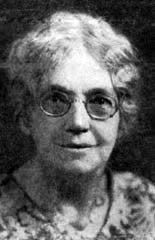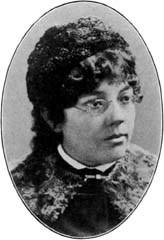
MRS. WILBUR BROTHERTON
As She Is Today
The interview was published on the front page in the February 1930 issue of the Bulletin of the Michigan League of Women Voters. This electronic partial facsimile was produced from a yellowed and torn original with penciled corrections, using an Epson flatbed scanner and optical character recognition (OCR) software. To improve readability, extraneous information, such as advertisements, was deleted, column and page breaks were removed, and lines were reflowed, but no other editing was done aside from the addition of hyperlinks. Misspellings in the original, e.g., "Wilbur" for "Wilber" and "Maude" for "Maud," have been retained. The accompanying photographs were scanned separately and then edited by StuVO with Adobe Photoshop to remove creases and enhance contrast.
This document may be printed to show to people without access to the Internet, but please retain this introduction and the information at the bottom of the page.
| Vol. VIII | FEBRUARY, 1930 | No. 2 |
The last issue of the Bulletin carried the story of the outstanding contribution which Dr. Anna Howard Shaw made to the progress of women in this country and of her nomination by the Michigan League of Women Voters to the national honor roll, which is to be compiled during this anniversary year. Now we announce the nomination of one of our leaders who is still with us, one who was a leader in the great struggle for suffrage, and who today, as then, is an outstanding citizen, one whose name and influence we delight to perpetuate--Mrs. Wilbur Brotherton of Detroit and Michigan.
The story of Mrs. Brotherton's life is full of interest and we give it as she herself told it in a reminiscent hour, as she chatted with Mrs. D. A. Bentley, president of the Wayne County League:
"In the fifties of the Nineteenth Century a farmer in Northern Ohio, anxious to give his young folks more education than the schools of his county afforded, decided to move to the village of Westerville on the post road between Columbus and Cleveland, that they might attend Otterbein University. With the assistance of these same young folks, he would manage the tavern known as the Stoner House. Disposing of his farm and moving was a slow process in those days, and before the educational process had gone very far, four of the five children had married and moved to other parts of the country. My mother, however, though also married, stayed with her father, and thus I happened to be born in this historic village and house on October 12, 1857.
"Westerville for many years has been the center of prohibition activities, and my grandfather's tavern, the Stoner House, was the birthplace of the National Anti-Saloon League and later of the World League Against Alcohol. Of course both organizations still flourish.
"Just before the close of the Civil War the family, now including four

children, moved to Columbus. My earliest recollection of any great event is of going with my mother to the capitol and being lifted up by her to see the martyred Lincoln. Imagination portrays the ivory face of the Liberator but the child who saw him was far more deeply moved by the thousands of pedestrians with streamers of crepe who thronged the streets and the plumed carriages which slowly moved through the wide opened gates of the park-like block in which the great stone building with its columned porches stood.
"War echoes were heard in songs of the time, both in public schools and from a crippled soldier who each warm evening sang to children gathered about him--'Goodby Susanna,' 'John Brown's Body,' as well as 'Annie Laurie' and 'In Jersey City Where I Dwell.'
"I early developed a passion for reading, and after the books at home were devoured, including the entire Bible and three fat volumes of Miss Porter's 'Thaddeus of Warsaw' and 'Scottish Chiefs,' I marshaled the three younger brothers and sisters to Sunday school regularly, in order to draw books on their cards. I was encouraged in this because I was awarded a lovely large quarto gift book for gathering the largest number of children into the Sunday school. Soon after this the superintendent offered a $5.00 Bible to the child committing to memory and reciting before lessons the greatest number of verses in a year. A BIG Bible made a great appeal to me, as I imagined it lying on the parlor table, and I determined to win it. When the winners were announced a boy named John Henry and myself had, as I recall, recited over seven thousand verses, and each of us was awarded a Bible. But, alas for me, mine was not big. It was a small purple velvet one with a gold clasp and gold edges. It made no appeal whatever to me. Each Saturday when I had to dust the parlor I knocked it onto the floor, so that its disintegration was effected in a few years.
"Soon after the city opened a public library, and I soon lost interest in the Sunday school.
"After finishing my high school course I was unable to go on to college until after teaching nearly four years. I then entered Ohio State University with advanced credits in both Latin and Greek. The second year I was offered the position of librarian, was made an assistant teacher in Greek, was chosen as an editor of the Lantern, helped organize a tennis club, a Browning Dramatic Society, and married my good husband. His keen sensitiveness to any form of injustice made him an ardent supporter of woman's struggle for political freedom, since the majority of women wanted the vote as a tool to help accomplish their life work--that of rearing and safeguarding children.
"In 1888 we moved to Detroit, which even with its population of 150,000, was still a beautiful big village, with its tree-shaded streets and grassy lawns, its plank sidewalks and cedar block paved streets.
"For years the cares incident to rearing seven children precluded any outside activities, though I was a charter member of the Clio club and enjoyed the stimulus which its contacts afforded.
"In college I had read John Stuart Mill's Life and his Subjection of Women, so that when the Michigan Legislature granted school suffrage to women I was eager to use it.
"With two children I went to a saloon on Riopelle street to register. The barroom was empty save for a neat young Polish woman and an anemic child nodding in a high chair. When I explained my errand she pointed to a rear door. In this room four men sat playing cards. Upon my entrance each removed his hat from his head, his pipe from his lips, and laid his cards on the table. One man rose and opened a large book, while the others stared in amazed, silence as he wrote my name and address. And in silence we withdrew. In the lists of women registrants in the various districts, my district had but the one.
"As the children entered school my interest in school affairs naturally increased. The ward system of electing school board members was then in vogue and when it was discovered that the chairman of the text book committee was a saloonkeeper unable to read English, an effort was made to elect a different sort of inspector. It soon became apparent that the system itself needed changing. A movement was initiated for a small board elected from the city at large. I was happy to assist, and with many others, made trips to Lansing time and again until the change was effected. I later continued my training as a legislative worker with the Federation of Women's Clubs and later with the Equal Suffrage Association.
"By this time my children were grown and away at school, so that I was free to give more time to outside activities and became much engrossed in the work of promoting suffrage. I held various chairmanships, including legislative and finance, and was finally

the last president of the Wayne County Equal Suffrage Association and the first president of the Michigan League of Women Voters."
Mrs. Brotherton took an active part in the state suffrage campaigns of 1912, 1913 and 1916, and had much to do with the ratification of the Nineteenth Amendment by the Michigan Legislature.
She recalls with delightful memories the national suffrage conventions which she attended--especially those held in Washington, when delegations from each state called upon their senators and representatives. The change, she recalls, from bored attention to enthusiastic belief was most encouraging.
"Many figures," she says, "are etched on my memory. There was Jane Addams of Chicago; Miss Thomas of Bryn Mawr, with her fearless intellect; that sturdy farmer woman, Laura Clay of Kentucky-- kinswoman of Henry Clay; beautiful Mrs. Pinchot--efficient Mrs. McCormick. There was also the business-like chairman from Pennsylvania, whose feats of marshaling her large delegation to an early breakfast and of entering and leaving each of the daily sessions in a compact group, moved the gasping admiration of less capable executives.
"In the background and always present in consciousness stand the three great leaders who directed our course in these years-- Dr. Anna Shaw and Mrs. Carrie Chapman Catt before suffrage was won, and Maude Wood Park afterwards.
"In thinking of those first efforts I am conscious of the fact that we made some mistakes in endorsing and working for measures which appealed to us as promising to remedy certain evils without finding out how these measures had worked as laws in other states. There was much to learn. Intoxicated with a sense of power, we rushed in not where angels fear to tread but where experienced legislators go very slowly with eyes scanning the entire horizon. That 'knowledge comes, but wisdom lingers' is still true, but with the accumulated knowledge of the League of Women Voters wisdom will not be far behind."
Mrs. Craig Miller of Marshall is general chairman of the Anniversary and Memorial Fund for Michigan.
Mrs. Katherine Atkinson is chairman of the memorial for Mrs. Brotherton, and may be reached at 914 West Euclid avenue, Detroit.
Dr. Caroline Bartlett Crane is chairman of the Anna Howard Shaw memorial, and may be reached at Hillcrest avenue, Kalamazoo.